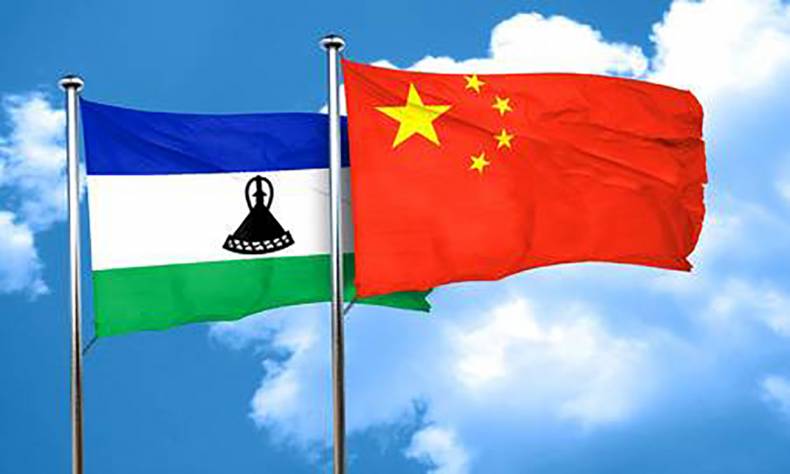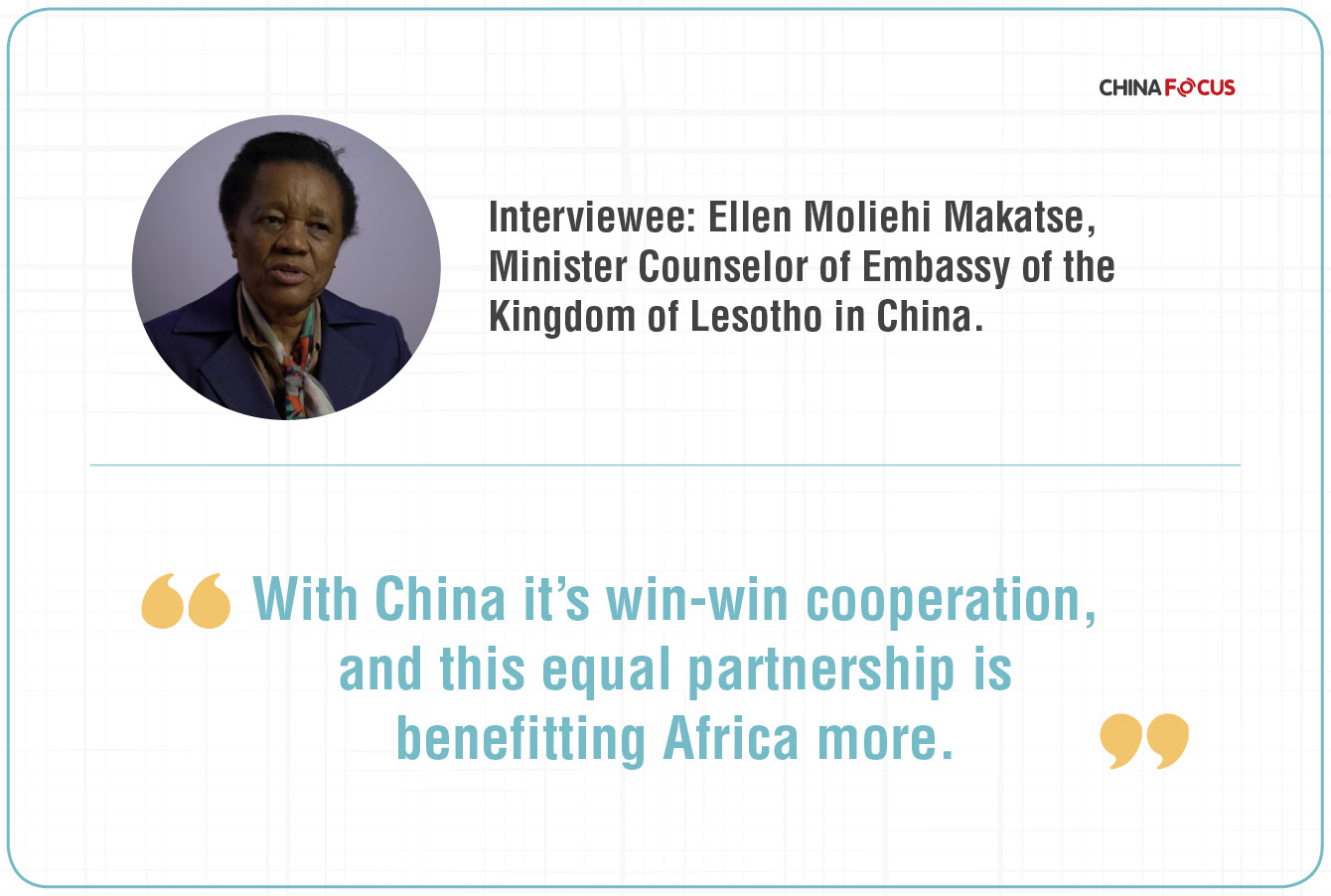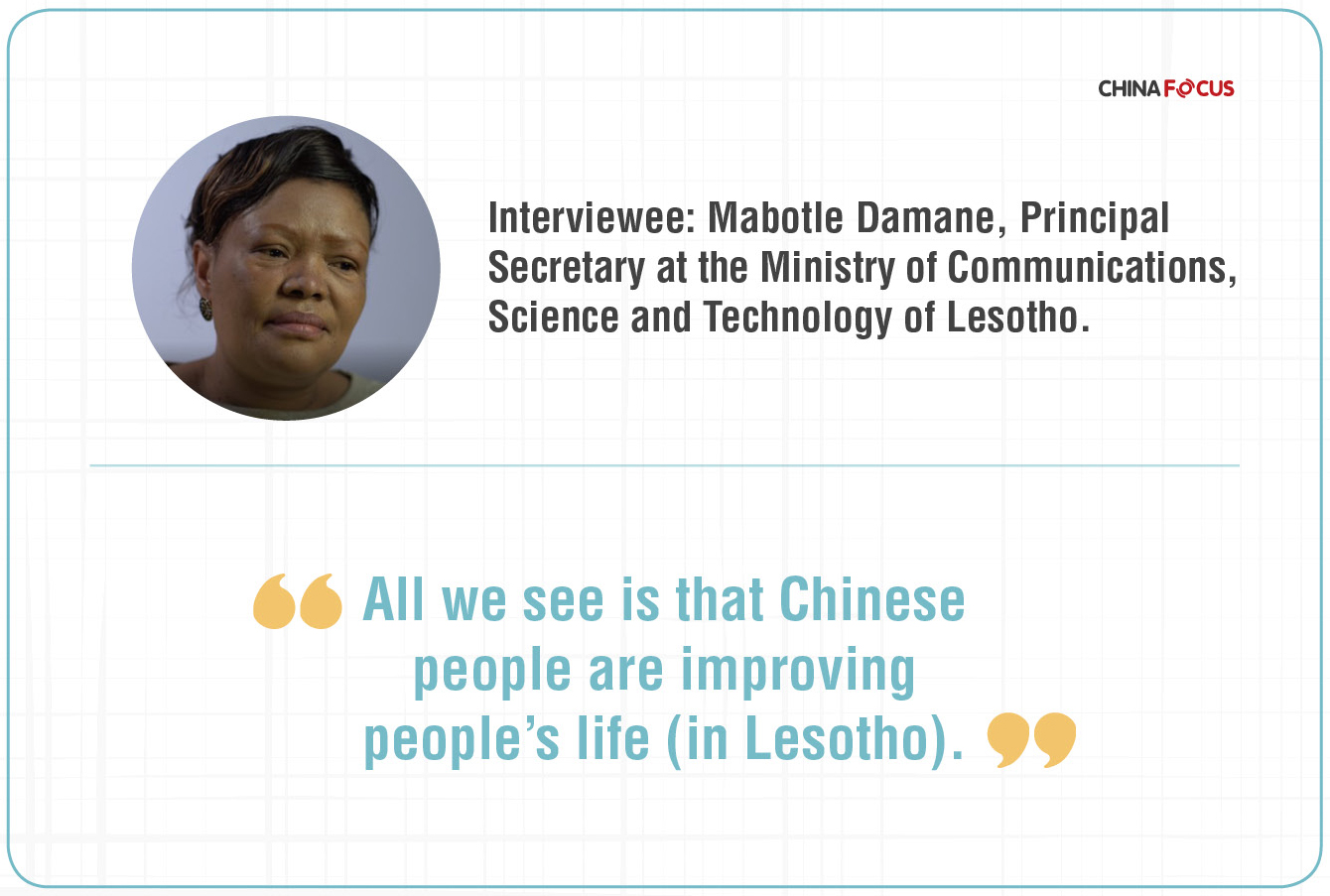
Win-Win Cooperation with China Benefits Lesotho
“When we trade with China, it’s win-win cooperation, and this equal partnership is benefitting Africa more.”
We Are One: When China Meets Africa
The 2018 Beijing Summit of the Forum on China-Africa Cooperation (FOCAC) will be held in Beijing on September 3 and 4 under the theme “China and Africa: Toward an even stronger community with a shared future through win-win co-operation”.
Chinese President Xi Jinping will chair the summit and host relevant events. Leaders of the FOCAC African members will attend the summit upon invitation, and representatives of relevant regional organizations in Africa and international organizations will also participate in related activities.
So how to understand China-Africa relations? What can be done to deepen mutual beneficial cooperation? China Focus interviews people from 10 African countries, revealing the truths of China-Africa relations.
 China Focus: Could you please introduce Lesotho to us?
China Focus: Could you please introduce Lesotho to us?
Ellen Moliehi Makatse: Lesotho is a very small country, with only 2 million people. It’s completely surrounded by one country and thus it is landlocked.
We don’t have access to the sea, and surrounding Lesotho is one country: South Africa. Fortunately, we have long been on good terms with South Africa. In addition, Lesotho is a very mountainous country. Three quarters of it are covered with mountains, so unlike some other African countries, we have very cold winters. Lesotho is a very beautiful country thanks to its mountains. The scenery is excellent, especially in the summer. But, if you visit in the wintertime after the snow falls, you can also go skiing in Lesotho.
China Focus: You’ve been in China for five months. What’s your impression of the country?
Ellen Moliehi Makatse: I find that Chinese people are very sweet and gentle, and they show no signs of discrimination. Another impression I’ve had about China is that a few years ago it was not so rich, but now it’s one of the world’s leading economies and the second largest economy in the world. I really want to see how Chinese people have managed to work so hard to make this happen, because our country may learn from the Chinese experience.
China Focus: Could you please tell us about the exchange and communication that exists between the Chinese and Basotho people?
Ellen Moliehi Makatse: Our relationship with China dates back many years. We have a large community of Chinese people in Lesotho, and they own many textile factories, which have provided jobs for our people. In fact, some of the Chinese people who have been there for a long time have now become Lesotho citizens. Chinese people adapt to different societies quite easily because the way they live is very similar to us. They are family-oriented. In our embassy, we work with Chinese people. We are like a family.
Last year the Chinese ambassador in Lesotho brought a group of Chinese people to Lesotho for cultural exchange and to promote tourism in our country. Here in China we have about 1,000 students from Lesotho studying various courses such as medicine, technology and others. They are quite happy here and most of them are on Chinese scholarships.
China Focus: Some in the Western media say that China is turning Africa into a colony. What’s your take on this kind of sentiment?
Ellen Moliehi Makatse: I don’t agree with that. Most of Africa was colonized by Western countries. When we achieved independence, they still came back as colonial masters. We’ve never benefited from doing trade with them. So now Africa has found China, and our relationship with China is different, not that of a master and a servant. We are equal partners. When we do business with Western companies, we cannot gain much in terms of profits because we have no share in their companies. But when we trade with China, it’s win-win cooperation, and this equal partnership is benefitting Africa greatly. The soft loans that we get from China are better than the loans that we get from Western countries.
China Focus: Could you please tell us about the nature of the relationship between Chinese people and local people in Lesotho?
Mabotle Damane: In Lesotho, our relationship with Chinese people is good. We interact with one another and achieve all tasks we set out to achieve. The local people are aware that Chinese people are here to help, especially because they have created many jobs for the locals. They engage in business and are quite nice, just like the Basotho people, so we communicate harmoniously.
China has many advanced techniques, and can help us a lot. Because of Chinese people, we are able to gain access to many more opportunities and our quality of life has greatly improved. For example, Chinese construction companies have built a large number of buildings in Lesotho. We have confidence in these companies in terms of cooperation. Chinese people build infrastructure, and also teach us new technologies. Most Basotho people have little knowledge of technology, so we usually learn from the Chinese. Compared to the past, local people’s lives have been greatly improved. Many local people are now employed by Chinese companies. The government of Lesotho is satisfied with the Chinese people.
China Focus: Why do you think Lesotho cooperates with China?
Mabotle Damane: We are struggling with limited infrastructure, so we have to improve our local infrastructure before we bring in new technology. We prefer to deal with Chinese people because we know that they can do an excellent job in road and building construction. The Basotho people cannot take on such huge infrastructure work even if they presume themselves to be better at it than Chinese people. Therefore, we give them work on the subcontracts.
I work in media and public communication. We hope that all Basotho people can gain access to information. But in some parts of our country, we even cannot afford to access the weather forecast. Our outdated national broadcasting services don’t accommodate additional radio stations. Through our partnership with Star Times, a Chinese private broadcaster, we are set to install new transmitters all around the country, so the Basotho people can gain access to information from around the globe, which in turn will help them make decisions. They will learn how to make money in Lesotho as well as in other countries. That’s why we need the media and that’s why we cooperate with China.
China Focus: Does the government of Lesotho have any plans in terms of future cooperation with Chinese companies?
Mabotle Damane: Yes, we want to cooperate with China, and we have started negotiating with StarTimes. We’d like to invite them to participate in the construction of broadcasting services in Lesotho and both sides have agreed to employ more Basotho people. Together, they will construct the National Broadcasting Services and related studios in Lesotho. The improved technology in broadcasting will enable people to access information more easily.
Interviewer: Cheng Yao
Editor: Shou Pan, Elena
 Facebook
Facebook
 Twitter
Twitter
 Linkedin
Linkedin
 Google +
Google +











